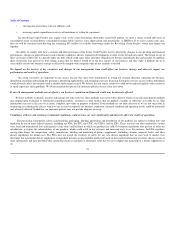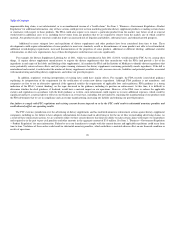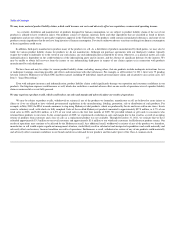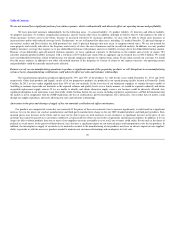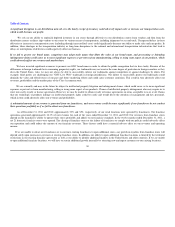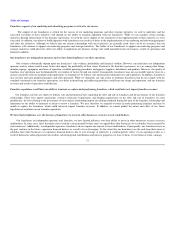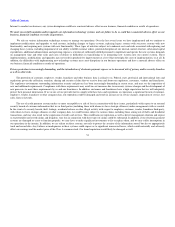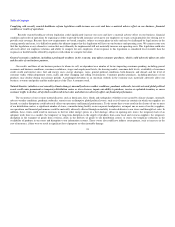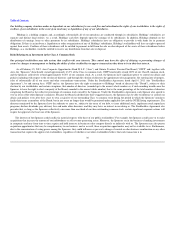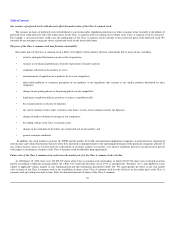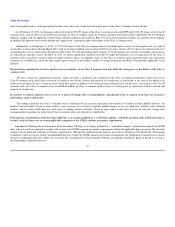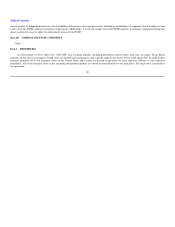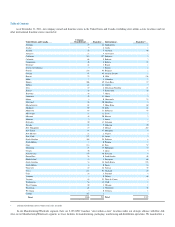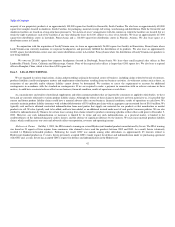GNC 2012 Annual Report Download - page 37
Download and view the complete annual report
Please find page 37 of the 2012 GNC annual report below. You can navigate through the pages in the report by either clicking on the pages listed below, or by using the keyword search tool below to find specific information within the annual report.
Table of Contents
Complying with recently enacted healthcare reform legislation could increase our costs and have a material adverse effect on our business, financial
condition or results of operations.
Recently enacted healthcare reform legislation could significantly increase our costs and have a material adverse effect on our business, financial
condition and results of operations by requiring us either to provide health insurance coverage to our employees or to pay certain penalties for electing not to
provide such coverage. Because these new requirements are broad, complex, subject to certain phase-in rules and may be challenged by legal actions in the
coming months and years, it is difficult to predict the ultimate impact that this legislation will have on our business and operating costs. We cannot assure you
that this legislation or any alternative version that may ultimately be implemented will not materially increase our operating costs. This legislation could also
adversely affect our employee relations and ability to compete for new employees if our response to this legislation is considered less favorable than the
responses or health benefits offered by employers with whom we compete for talent.
General economic conditions, including a prolonged weakness in the economy, may affect consumer purchases, which could adversely affect our sales
and the sales of our business partners.
Our results, and those of our business partners to whom we sell, are dependent on a number of factors impacting consumer spending, including general
economic and business conditions; consumer confidence; wages and employment levels; the housing market; consumer debt levels; availability of consumer
credit; credit and interest rates; fuel and energy costs; energy shortages; taxes; general political conditions, both domestic and abroad; and the level of
customer traffic within department stores, malls and other shopping and selling environments. Consumer product purchases, including purchases of our
products, may decline during recessionary periods. A prolonged downturn or an uncertain outlook in the economy may materially adversely affect our
business, revenues and profits and the market price of the Class A common stock.
Natural disasters (whether or not caused by climate change), unusually adverse weather conditions, pandemic outbreaks, terrorist acts and global political
events could cause permanent or temporary distribution center or store closures, impair our ability to purchase, receive or replenish inventory or cause
customer traffic to decline, all of which could result in lost sales and otherwise adversely affect our financial performance.
The occurrence of one or more natural disasters, such as hurricanes, fires, floods and earthquakes (whether or not caused by climate change), unusually
adverse weather conditions, pandemic outbreaks, terrorist acts or disruptive global political events, such as civil unrest in countries in which our suppliers are
located, or similar disruptions could adversely affect our operations and financial performance. To the extent these events result in the closure of one or more
of our distribution centers, a significant number of stores, a manufacturing facility or our corporate headquarters, or impact one or more of our key suppliers,
our operations and financial performance could be materially adversely affected through an inability to make deliveries to our stores and through lost sales. In
addition, these events could result in increases in fuel (or other energy) prices or a fuel shortage, delays in opening new stores, the temporary lack of an
adequate work force in a market, the temporary or long-term disruption in the supply of products from some local and overseas suppliers, the temporary
disruption in the transport of goods from overseas, delay in the delivery of goods to our distribution centers or stores, the temporary reduction in the
availability of products in our stores and disruption to our information systems. These events also could have indirect consequences, such as increases in the
cost of insurance, if they were to result in significant loss of property or other insurable damage.
35


